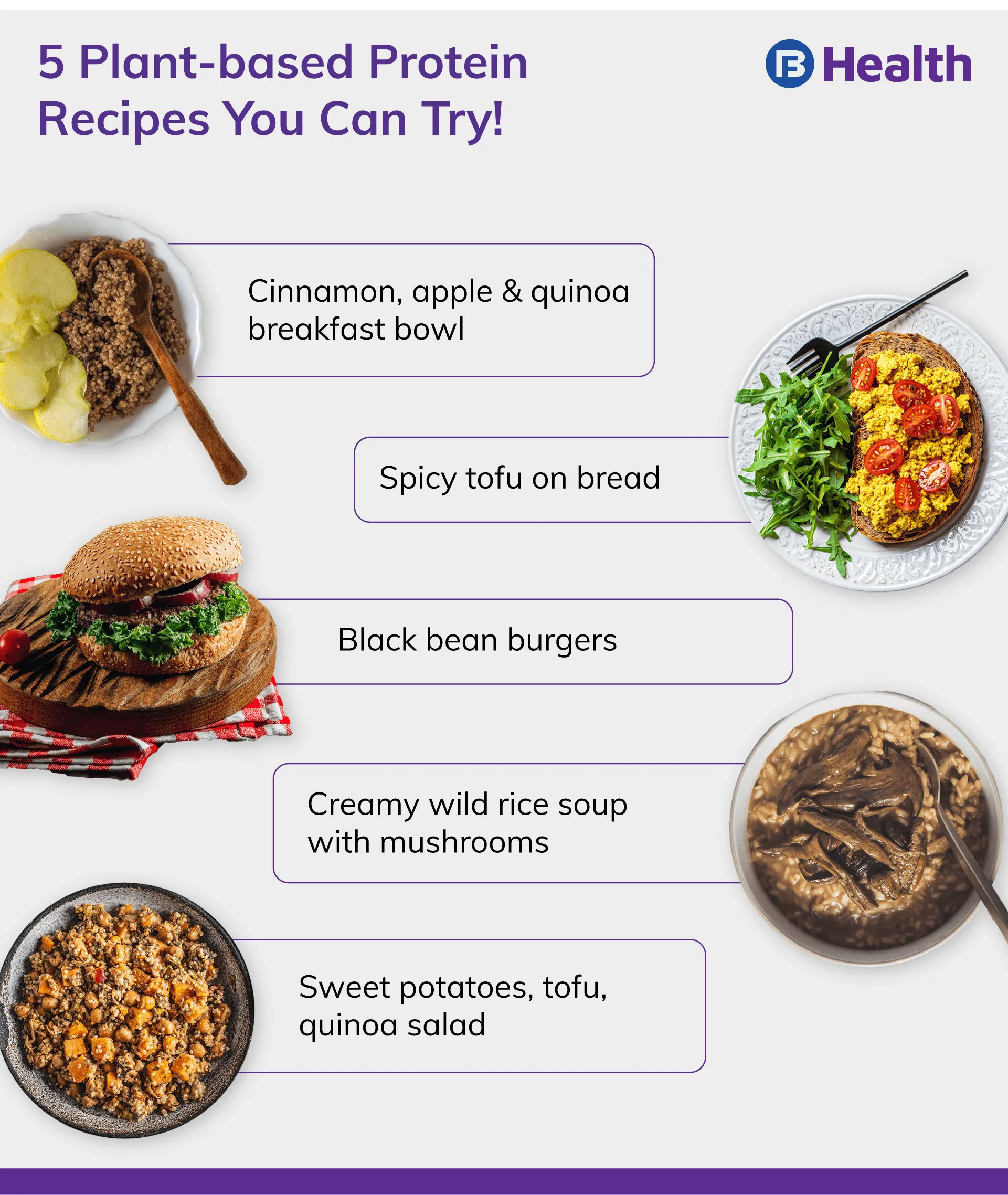Nutrition | 4 min read
Plant-Based Protein: Pros and Cons You Should Know
Medically reviewed by
Table of Content
Key Takeaways
- Plant-based protein examples include tofu, almonds, and peanuts
- Improved gut health is one of the major plant-based protein benefits
- Have plant-based protein alternatives for better heart health
The global trend of eating plant-based protein for health and wellbeing is on the rise. Consumer preference is changing, and people are adopting this diet. This nutritional diet is mainly focused on a sustainable lifestyle and low dependency on animal-based protein. This shift to plant-based protein foods is due to the disadvantages of animal protein, such as an increased risk to your heart health.
Apart from this, a majority of the population is changing their food habits and adapting to plant-based foods due to:
- Increased product availability
- New and improved products in the market
- Innovation in things related to plant-based protein
- Easy availability of alternatives or substitutes
Read on to understand how plant-based protein benefits your body.
Additional Read: Amazing Benefits of Pineapple
Facts about plant-based protein
Is plant-based protein better for you than animal-based protein?
It is a common misconception that animal-based protein is the only rich source of protein. If you consume plant-based proteins like nuts and seeds, the body gets enough amino acids. This helps support the build and repair functions in the body.
Is plant-based protein powder bad for you?
Moderation is the key when it comes to plant-based protein powder. Make sure that you do not replace your meals with it or consume them in excess. Other than this, you should also know how to use plant-based protein powder. One of the ways is to consume the powder with milk to make a plant-based protein shake.
Do plant-based proteins build muscle?
A plant-based protein-rich diet supports muscle strength and gains. It helps build muscle. Keep in mind that plant-based protein foods can be a helping hand. You will need to perform regular strength training and exercise for better results.

Plant-based protein pros and cons
Pros
- Helps reduce harmful bacteria in the body
Plant-based protein has a lower amount of saturated fat that is harmful to the heart. This protein is also easier to digest and free from harmful bacteria. It keeps you healthy and strong by helping your immune system to fight off diseases.
- Aids in improving athletic performance [1]
Protein is an essential ingredient while training for any sports or keeping your body fit and muscular. They help decrease cardiovascular risks and reduce body fat which leads to a leaner body. All of these factors are integral not only for athletes but all individuals. Together they help lead a healthy lifestyle and improve overall health.
- Keeps your gut healthy [2]
The more you consume plant-based protein, the healthier your gut is. Plant-based foods are rich in fiber and nutrients that help detoxify your body. They also help promote the development of various kinds of microbial systems in the gut.

Cons
- May lead to deficiency in certain nutrients
Plant-based diets require you to carefully choose what you are putting into your body. You need to make sure that you have a balanced diet that includes nutrients like vitamins, proteins, and zinc. Focusing on just eating plant-based protein food can result in a deficiency of other nutrients.
- May cause difficulty in absorbing protein
Eating plant-based food could lead to a protein-deficient diet. This is because some foods like rice and beans are incomplete protein sources unless combined with other sources. Make sure you eat a plant-based diet with the necessary amount of amino acids. Amino acids help absorb the protein.
- It may lead to vitamin B12 deficiency.
Vitamin B12 is not created by the body. Animal-based diets provide a substantial amount of vitamin B12. You can include beetroot, potatoes, and mushrooms to maintain your vitamin B12 levels.
Additional Read: Benefits of Consuming Beetroot in WinterSwitching from animal proteins, you can gain high levels of protein through plant-based protein alternatives. Some plant-based protein examples are as follows.
- Peanuts
- Almond
- Tofu
- Lentils
- Chickpeas
- Quinoa
- Tempeh
- Chia seeds
- Nutritional yeast
Keep in mind that this plant-based foods list is not an overall list. There are various other foods that provide proteins like beans and rice. These foods are incomplete sources of protein, unlike animal proteins. This means when eaten alone, and these protein sources lack essential amino acids. You can remedy this by combining them with plant-based proteins.
Now that you have an idea of the benefits of eating plant-based proteins, you can select the best plant-based protein options for yourself. To understand more about which food is best for you or to get help regarding any medical issue, talk to an expert. Book an online doctor consultation on Bajaj Finserv Health without delay and put your health and wellbeing first!
References
- https://www.ncbi.nlm.nih.gov/pmc/articles/PMC6356661/
- https://www.ncbi.nlm.nih.gov/pmc/articles/PMC6478664/
Disclaimer
Please note that this article is solely meant for informational purposes and Bajaj Finserv Health Limited (“BFHL”) does not shoulder any responsibility of the views/advice/information expressed/given by the writer/reviewer/originator. This article should not be considered as a substitute for any medical advice, diagnosis or treatment. Always consult with your trusted physician/qualified healthcare professional to evaluate your medical condition. The above article has been reviewed by a qualified doctor and BFHL is not responsible for any damages for any information or services provided by any third party.




